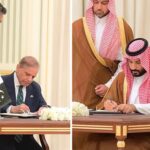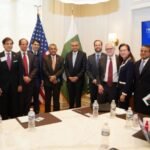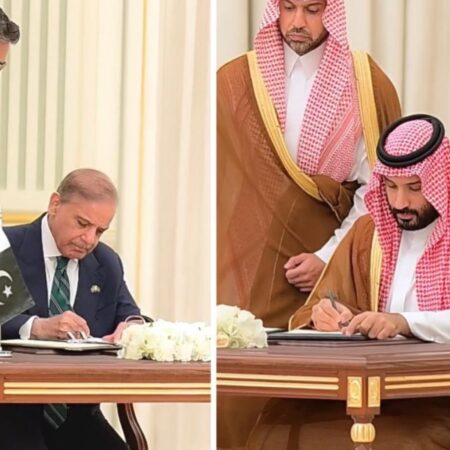BEIJING: In a ministry statement issued Saturday, China’s Commerce Minister Wang Wentao informed the head of the World Trade Organization (WTO) that US tariffs will “cause serious harm” to developing countries.
This month, Washington and Beijing have been exchanging increasingly steep tariffs, which has caused global markets to plummet and stoked concerns about a growing trade war between the two biggest economies in the world.
The interruption of commerce between the closely intertwined US and Chinese economies, according to economists, will raise consumer prices and may lead to a worldwide recession.
According to the statement, Wang reminded WTO chief Ngozi Okonjo-Iweala in a call on Friday that the US “reciprocal tariffs” would seriously hurt poor nations, particularly the least developed ones, and would even lead to a humanitarian disaster.
According to Wang, “The United States has consistently imposed tariff measures, causing chaos both internationally and domestically within the US, and bringing tremendous uncertainty and instability to the world.”
Beijing announced that its 125 percent tariffs on US imports would go into force on Saturday, nearly matching the startling 145 percent duties Washington has placed on Chinese goods coming into the US.
However, Beijing stated that it no longer made economic sense for importers to purchase from America; therefore, it will disregard any more tariffs imposed by US President Donald Trump.
China also slammed Trump’s increasing brinkmanship as a “joke” and a “numbers game” and declared it will sue the WTO over the most recent round of levies.
Beijing’s response caused new market turbulence, with US government bonds under pressure, gold prices rising, and equities swaying.
According to Beijing’s customs figures, sales of Chinese commodities to the United States last year totaled over $500 billion, or 16.4% of the nation’s exports, demonstrating the size of the trade between the two economic adversaries.
Despite the recent increases from China, Trump maintained that his tariff approach was “doing really well.”
He delayed the imposition of punitive tariffs on some trading partners for three months earlier this week, following the depletion of global markets of trillions of dollars.
According to the White House, Trump is still “optimistic” about reaching an agreement with Beijing, and 15 other nations have offers “on the table” while he is on a 90-day tariff hiatus.
Tariff negotiations
In the meantime, Taiwan’s administration announced on Saturday that it had held initial tariff talks with the US and anticipated further conversations to establish “strong and stable” economic relations.
In an attempt to protect its exporters from a 32 percent duty, Taiwan’s president, Lai Ching-te, stated that the island was on “the first negotiating list of the US government.”
Lai stated that negotiations will aim to reach an agreement with Washington to reduce Taiwan’s current 10% tariff to zero.
On Saturday, Taiwan’s Office of Trade Negotiations stated that, without naming them, Taiwanese officials had a video conference with “relevant US officials” the day before.
“The two sides discussed a variety of other economic and trade issues, such as export controls, as well as Taiwan-US reciprocal tariffs and non-tariff trade barriers,” the statement continued.
With a trade surplus of US$73.9 billion in 2024, Taiwan has the seventh-highest trade surplus of any nation.
Semiconductors and other items related to information and communications technology account for over 60% of its exports to the US. Trump’s new tariffs, however, did not apply to semiconductors.












No Comment! Be the first one.